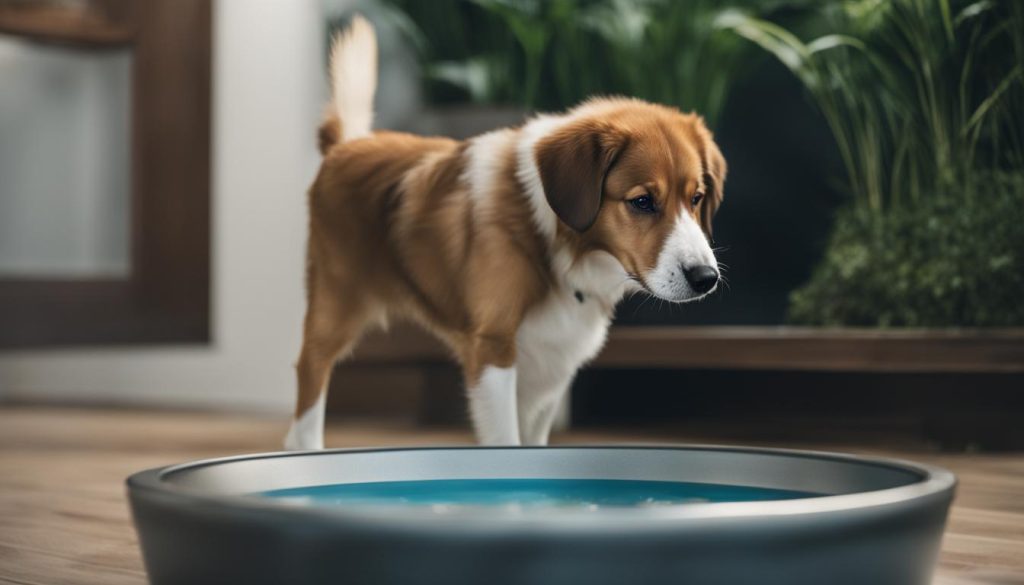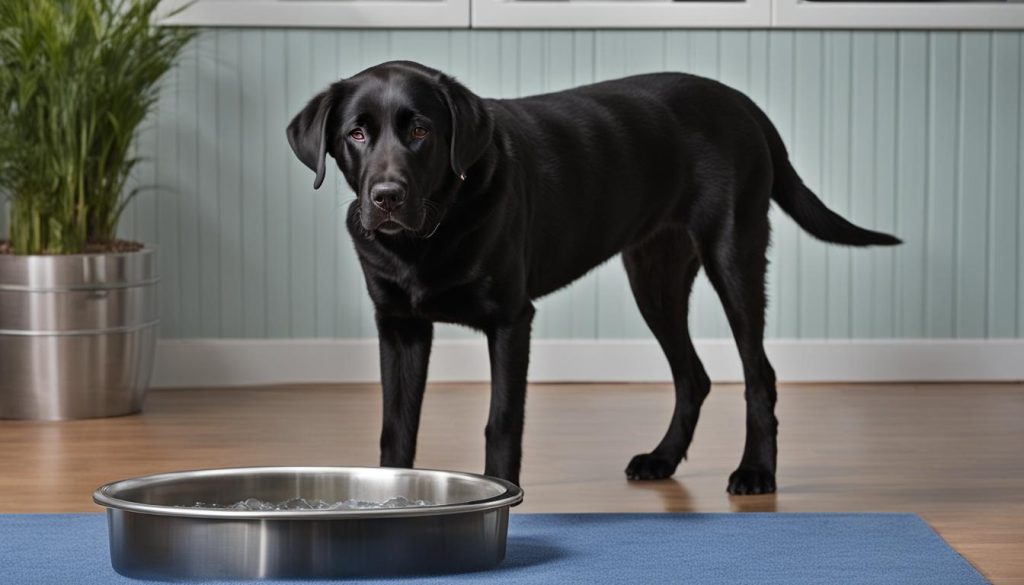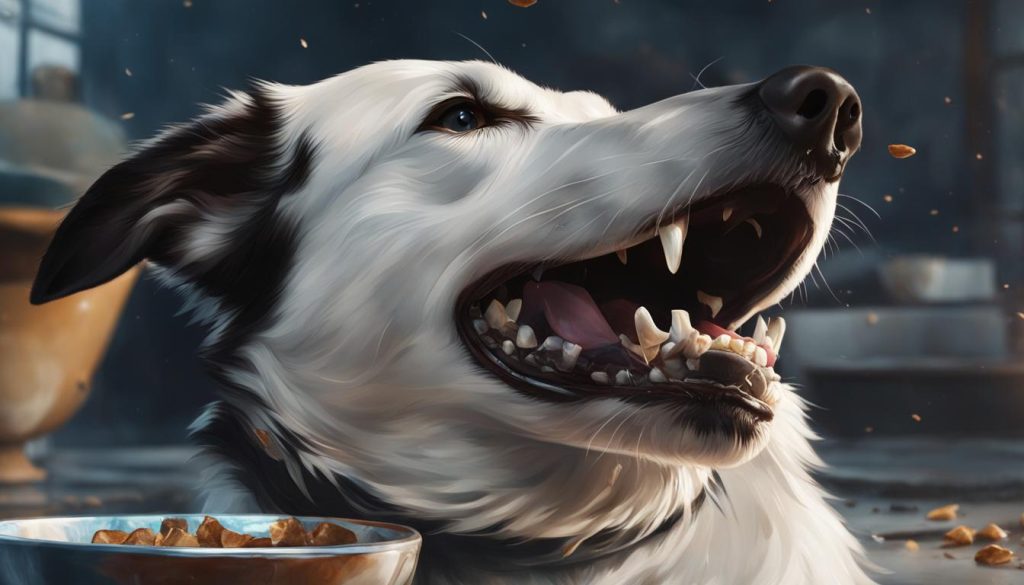As a pet owner, I understand the importance of keeping our furry friends happy and healthy. One crucial aspect of their well-being is ensuring they stay hydrated. Just like humans, dogs need water to survive and maintain their overall health. But what should you do if your dog refuses to drink water? In this article, I will explore the signs and symptoms to look for when your dog won’t drink water, as well as the potential reasons behind this behavior. Understanding the underlying causes can help you address the issue and ensure your dog’s health and hydration needs are met.
Key Takeaways:
- Dogs require one ounce of water per pound of body weight daily.
- Dehydration poses a higher risk to dogs due to their inability to sweat.
- Reasons why a dog may refuse to drink water include changes in weather, unfamiliar places, health problems, old age, negative associations with drinking, mouth injuries, and teeth damage.
- Monitor your dog’s water intake and seek veterinary assistance if necessary.
- Encouraging hydration in your dog is crucial to their overall health and well-being.
Change in Weather
A change in weather can affect a dog’s water intake. During cooler temperatures, dogs may not feel as thirsty and therefore drink less water. This is typically normal as long as the dog does not completely stop drinking. However, it is important to monitor their water intake to ensure they stay hydrated. Dogs who are not engaging in high levels of physical activity may also show decreased interest in drinking water.
In order to encourage your dog to drink water during changes in weather, you can try a few tips. Firstly, make sure that fresh water is always available to them by regularly refilling their water bowl. You can also try adding flavor to the water by using broth or a small amount of low-sodium chicken or beef stock. Another option is to offer your dog ice cubes made from chicken or beef broth, which can be a refreshing and hydrating treat. Lastly, ensure that your dog has access to shaded areas or air-conditioned spaces during hot weather to prevent dehydration.
To summarize, a change in weather, particularly during cooler temperatures or when dogs are less active, can cause them to drink less water. It is important to monitor their water intake and take steps to ensure they stay hydrated, such as providing fresh water, adding flavor, offering ice cubes, and providing appropriate shelter during hot weather.
Table: Tips for Encouraging a Dog to Drink Water during Weather Changes
| Tips | Description |
|---|---|
| Always provide fresh water | Ensure your dog’s water bowl is regularly refilled with clean, fresh water. |
| Add flavor to the water | Try adding a small amount of low-sodium chicken or beef stock to make the water more appealing to your dog. |
| Offer ice cubes | Make ice cubes from chicken or beef broth and offer them as a refreshing and hydrating treat. |
| Provide shade and shelter | Ensure your dog has access to shaded areas or air-conditioned spaces during hot weather to prevent dehydration. |
Remember, if you have any concerns about your dog’s water intake or hydration levels, it is always best to consult with your veterinarian for guidance and advice.
Unfamiliar or New Places

Dogs are creatures of habit, and any change in their environment can be unsettling for them. When in unfamiliar or new places, dogs may exhibit changes in behavior, including a reduced intake of water. This is because their sensitive noses can detect unfamiliar water sources, leading them to perceive it as potentially unsafe.
To address this issue and encourage your dog to drink water in unfamiliar places, it can be helpful to bring a water bottle or bowl from home. By providing a familiar water source, you can help your dog feel more comfortable and confident in hydrating themselves.
Additionally, try to create a calm and relaxed environment for your dog in unfamiliar places. This can help alleviate any anxiety or stress they may be experiencing, which can further contribute to their reluctance to drink water.
Tips for Encouraging Your Dog to Drink Water in Unfamiliar Places:
- Bring a water bottle or bowl from home to provide a familiar water source.
- Create a calm and relaxed environment to alleviate any anxiety or stress.
- Offer water frequently to remind your dog to drink.
- Monitor their water intake and consult a veterinarian if you have any concerns.
Remember, it’s essential to prioritize your dog’s hydration, especially in unfamiliar or new places. By understanding their needs and taking proactive measures, you can ensure that your dog stays healthy and well-hydrated, no matter where they are.
Health Problems
When a dog is not drinking water, it can be a sign of underlying health problems that need attention. Various conditions can affect a dog’s water intake, including bladder infections, urinary tract infections, diabetes, and kidney disease. These health issues may lead to reduced thirst, lethargy, and a lack of appetite in dogs.
If you notice your dog is not drinking water and displays other concerning symptoms, it is crucial to consult a veterinarian. A thorough examination and diagnostic tests can help determine the underlying cause of your dog’s decreased water consumption. Early detection and treatment of health problems can prevent further complications and ensure your dog’s overall well-being.
It is important to note that dehydration can be life-threatening for dogs, so prompt veterinary care should be sought if you suspect your dog is dehydrated. Some signs of a dehydrated dog include dry gums, loss of skin elasticity, sunken eyes, reduced urine output, and excessive panting.
Table: Common Health Problems Affecting a Dog’s Water Intake
| Health Problem | Symptoms |
|---|---|
| Bladder Infections | Painful urination, frequent urination, blood in urine |
| Urinary Tract Infections | Increased urination, straining to urinate, cloudy urine |
| Diabetes | Excessive thirst, increased urination, weight loss |
| Kidney Disease | Decreased appetite, weight loss, increased urination |
Remember, a healthy dog should have regular access to fresh, clean water throughout the day. If you suspect any health problems affecting your dog’s water intake, consult with your veterinarian for proper diagnosis and treatment.
Old Age

Older dogs may drink less water due to a variety of factors associated with aging. As dogs get older, their physical activity levels tend to decrease, leading to a reduced need for water. Additionally, older dogs may experience diminished thirst and hunger receptors, which can further contribute to a decrease in water intake. While it is expected for older dogs to drink less water, it is still important to ensure they stay hydrated to maintain their overall health and well-being.
To encourage your senior dog to drink more water, there are a few strategies you can try. Firstly, you can switch to wet food, as it contains higher moisture content and can help provide additional water intake. Adding water to your dog’s dry food or mixing it with wet food can also increase their overall water consumption. Another idea is to provide multiple water sources in different areas of your home, making it more convenient for your dog to access water throughout the day.
It’s important to monitor your senior dog’s water intake and encourage them to drink when necessary. If you notice a significant decrease in their water consumption or signs of dehydration, it is recommended to consult with a veterinarian to rule out any underlying health issues or discuss additional strategies to ensure your dog stays properly hydrated.
Table: Tips for Encouraging a Senior Dog to Drink Water
| Tip | Description |
|---|---|
| Switch to wet food | Wet food contains higher moisture content, providing additional water intake for senior dogs. |
| Add water to dry food | Mixing water with dry food can increase water consumption. |
| Provide multiple water sources | Place water bowls in different areas of your home to make it more convenient for your senior dog to access water. |
| Monitor water intake | Keep track of your dog’s water consumption and encourage them to drink when necessary. |
| Consult with a veterinarian | If you notice a significant decrease in water intake or signs of dehydration, seek professional advice to rule out underlying health issues or discuss further hydration strategies. |
Solutions for a Dog Not Drinking Water
If your dog is not drinking water, there are several strategies you can try to encourage them to stay hydrated. Here are some tips to help your dog drink more water:
Offer Fresh Water in Different Bowls
Dogs may associate a negative experience with a specific type of water bowl or its location. To overcome this, try introducing a new bowl that looks different or changing the location of the bowl. This can help your dog view drinking water as a positive activity.
Add Flavor to the Water
Sometimes, dogs may not find plain water appealing. Try adding a small amount of low-sodium chicken or beef broth to their water bowl to make it more enticing. However, be mindful of any dietary restrictions or allergies your dog may have before adding any flavorings.
Use Ice Cubes or Frozen Treats
Some dogs enjoy licking ice cubes or eating frozen treats, which can help increase their water intake. You can make ice cubes with low-sodium chicken broth or freeze small portions of wet dog food to provide a refreshing and hydrating snack for your pup.
Monitor Water Intake and Consult a Veterinarian
Keep track of your dog’s water intake to ensure they are drinking enough. If your dog continues to have difficulty drinking water or shows signs of dehydration, it is important to consult a veterinarian. They can evaluate your dog’s health and provide further guidance on how to address the issue.
Remember, proper hydration is vital for your dog’s overall health and well-being. By implementing these strategies and monitoring their water intake, you can help ensure your furry friend stays hydrated and healthy.
| Solutions for a Dog Not Drinking Water | Benefits |
|---|---|
| Offer Fresh Water in Different Bowls | Helps create positive associations with drinking water |
| Add Flavor to the Water | Makes water more appealing and enticing for your dog |
| Use Ice Cubes or Frozen Treats | Provides a refreshing and hydrating snack for your dog |
| Monitor Water Intake and Consult a Veterinarian | Ensures your dog’s health is evaluated and any underlying issues are addressed |
Injury in Their Mouth
One possible reason why a dog may refuse to drink water is if they have an injury in their mouth. Injuries such as splinters, plastic, or rocks can cause pain and discomfort, making it difficult for the dog to drink. It is essential to check your dog’s mouth regularly for any foreign objects and seek veterinary assistance if necessary. By addressing the injury and providing appropriate treatment, you can help your dog regain their ability to drink water comfortably.
If you notice that your dog is avoiding drinking water and suspect an injury in their mouth, it is important to act promptly. Ignoring the issue could lead to further complications and discomfort for your furry friend. Remember, your veterinarian is the best resource to diagnose and treat any oral injuries or abnormalities your dog may have.
| Signs of an Injury in a Dog’s Mouth | Causes of Mouth Injuries |
|---|---|
|
|
“If you suspect your dog has an injury in their mouth, it is important to have them examined by a veterinarian. They can provide the necessary treatment and ensure your dog’s mouth heals properly.”
Teeth Damage

Teeth damage in dogs can be a significant reason why they won’t drink water. Dogs with dental issues, such as broken or sensitive teeth, may experience discomfort when drinking cold water, causing them to avoid it altogether. Dental problems can not only impact a dog’s ability to drink but can also lead to other health issues if left untreated. It is crucial to address dental issues promptly to ensure your dog’s overall well-being.
If you suspect your dog has teeth damage or sensitivity, it is important to consult a veterinarian. They will be able to assess the extent of the problem and provide appropriate treatment. Professional dental cleaning, tooth extraction, or other dental procedures may be necessary depending on the severity of the damage.
“Dental problems in dogs, such as broken or damaged teeth, can cause pain and discomfort when drinking water. It is essential to address these issues to ensure your dog stays hydrated and maintains good oral health.” – Dr. Smith, Veterinarian
In the meantime, you can help make drinking water more comfortable for your dog with teeth damage. Providing room temperature or slightly warmer water can reduce sensitivity and make it easier for them to drink. You can also try using a shallow water bowl or a water fountain designed specifically for pets, as these can be more comfortable for dogs with dental problems.
| Signs of Teeth Damage in Dogs | Treatment Options |
|---|---|
| Broken or chipped teeth | – Dental cleaning and polishing – Tooth extraction if necessary |
| Discolored teeth | – Dental cleaning and whitening – Treatment for underlying dental issues |
| Tooth sensitivity | – Desensitizing treatments – Dental sealants – Tooth extraction if necessary |
Remember, addressing teeth damage in dogs is crucial not only for their ability to drink water but also for their overall oral health. Regular dental check-ups, proper oral hygiene, and prompt treatment of any dental issues will help keep your dog happy, healthy, and hydrated.
Wrapping Up
Ensuring your dog drinks enough water is crucial for their health and well-being. Just like humans, dogs need to stay hydrated to maintain optimal body function. By understanding the potential causes of a dog not drinking water and implementing effective strategies, you can encourage your dog to stay hydrated and prevent dehydration.
If your dog is not drinking water, there are several solutions you can try. Adding flavor to the water, such as a low-sodium broth or a small amount of tuna juice, can make it more enticing for your dog. Changing the water source, using a different type of bowl, or offering ice cubes can also help encourage your dog to drink more. It’s important to monitor your dog’s water intake and address any concerns promptly to maintain their overall health.
If you have tried these solutions and your dog still refuses to drink water, it is advisable to seek veterinary assistance. A veterinarian can evaluate your dog’s health and determine if there are any underlying medical conditions affecting their water consumption. Prompt intervention can help prevent dehydration and ensure your dog’s well-being.
Remember, proper hydration is essential for your dog’s health and hydration. By taking proactive measures and providing your dog with clean, fresh water at all times, you can help them lead a healthy and happy life.
FAQ
Why won’t my dog drink water?
There can be several reasons why a dog won’t drink water, including changes in weather, unfamiliar places, health problems, old age, negative associations with drinking, mouth injuries or teeth damage, and anxiety.
What are the signs and symptoms of a dehydrated dog?
Signs of a dehydrated dog include dry gums, lethargy, sunken eyes, loss of appetite, and panting excessively.
How much water should my dog be drinking?
Dogs should consume one ounce of water per pound of body weight every day, which doubles during hot weather or after exercise.
What can I do if my dog is not drinking water due to a change in weather?
Monitor their water intake to ensure they stay hydrated and consider offering wet food that can provide additional water intake during cooler temperatures.
How can I encourage my dog to drink water in unfamiliar or new places?
Try bringing a water bottle or bowl from home to provide a familiar water source for your dog.
What health problems can affect a dog’s water intake?
Health problems such as bladder infections, urinary tract infections, diabetes, and kidney disease can impact a dog’s water intake. Reduced thirst, lethargy, and lack of appetite may accompany these health issues.
Why are older dogs drinking less water?
Older dogs may drink less water due to decreased exercise and diminished thirst and hunger receptors. Switching to wet food can help provide additional water intake for senior dogs.
How can I help my dog if they associate drinking water with a negative experience?
Introducing a new bowl that looks different or changing the location of the bowl can help resolve this issue.
What should I do if my dog has an injury in their mouth?
Check their mouth for any foreign objects and consult a vet for assistance if needed.
How can teeth damage affect a dog’s water intake?
Dogs with dental issues, such as tooth damage or sensitivity, may avoid drinking water due to the discomfort caused by the cold water. Dental problems can lead to other health issues and should be addressed by a veterinarian.






